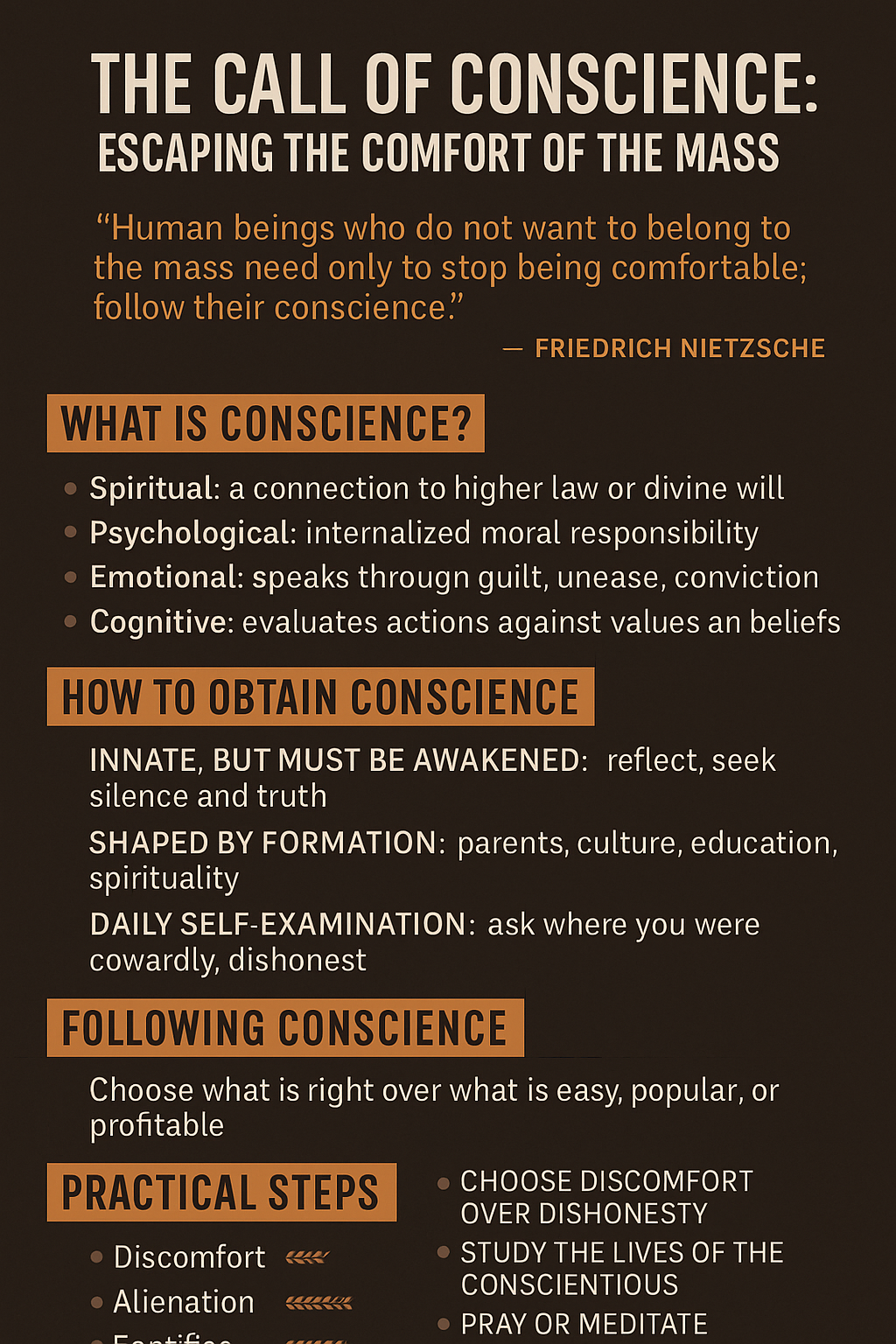“Human beings who do not want to belong to the mass need only to stop being comfortable; follow their conscience.” – Friedrich Nietzsche
Introduction: Against the Current of Comfort
Most people float along with the tide of culture, seeking security, convenience, and approval. Nietzsche challenges this with a radical alternative: step out of comfort and into conscience. To refuse the mass mindset, one must awaken an inner compass, embrace discomfort, and walk the lonely road of integrity.
But what is conscience? Why does it matter? And how do we follow it in a world built on conformity?
I. What Is Conscience?
Conscience is the moral faculty that distinguishes right from wrong within us. It’s not external law, public opinion, or religious rulebooks—it’s the inner judge, whispering truth even when silence is safer.
It is:
- Spiritual: a connection to higher law or divine will.
- Psychological: an internalization of moral responsibility.
- Emotional: it often speaks through guilt, unease, or conviction.
- Cognitive: it evaluates actions against our values and beliefs.
The Apostle Paul wrote that even Gentiles, without the law, had “the law written on their hearts, their conscience also bearing witness.” (Romans 2:15) This implies that conscience is universal—a divine spark in all.
II. How Does One Obtain a Conscience?
1. It’s Innate, But It Must Be Awakened
Every human is born with a capacity for conscience. But in a noisy, distracted world, it’s often buried under layers of comfort, pride, and conformity.
To awaken conscience:
- Quiet the noise of entertainment, distractions, and busyness.
- Reflect on suffering, injustice, and your complicity in them.
- Seek silence, solitude, and truth over popularity.
2. It’s Shaped by Experience and Formation
While conscience is innate, it is also formed by:
- Parents (whether they model courage or compliance)
- Culture (which can suppress or sharpen the conscience)
- Education (truth-seeking vs. indoctrination)
- Spiritual exposure (God’s truth awakens the deepest moral clarity)
“Educating the mind without educating the heart is no education at all.” – Aristotle
III. What Does It Mean to Follow Conscience?
Following your conscience means choosing what is right over what is easy, popular, or profitable. It requires saying:
- “I will not lie, even if it costs me.”
- “I will not go along with injustice, even if it isolates me.”
- “I will not abandon truth for applause.”
It often results in:
- Discomfort – Conscience rarely tells you to stay safe.
- Alienation – The mass follows comfort; conscience demands risk.
- Sacrifice – You may lose status, income, even relationships.
- Inner strength – What you gain is clarity, purpose, and dignity.
IV. Why Comfort Is the Enemy of Conscience
Comfort is seductive. It deadens the senses and numbs the soul. It tells us:
- “Don’t rock the boat.”
- “Don’t question authority.”
- “Just do what everyone else is doing.”
Comfort feeds the mass mentality—the herd that Nietzsche despised. The mass does not think—it obeys. The mass does not act—it reacts. The mass does not love truth—it fears being different.
“The man who follows the crowd will usually go no further than the crowd. The man who walks alone is likely to find himself in places no one has ever been.” – Albert Einstein
To follow conscience, you must be willing to leave the crowd behind.
V. How to Follow Your Conscience Practically
1. Daily Self-Examination
Ask: What did I do today that was cowardly? What did I ignore? Where did I betray what I knew was right?
2. Choose Discomfort Over Dishonesty
Every time you speak a hard truth, admit a mistake, or resist temptation, your conscience is strengthened.
3. Study the Lives of the Conscientious
Read about prophets, reformers, saints, whistleblowers, and martyrs. Their stories inspire and clarify the path.
4. Pray or Meditate
Conscience is not just logic—it is spiritual sensitivity. Stillness helps us hear what the world drowns out.
5. Disconnect from the Mass
Limit exposure to noise, mass media, and social comparison. Create space for reflection.
VI. The Cost—and Reward—of Conscience
Yes, following your conscience may cost you:
- Friends
- Promotion
- Comfort
- Belonging
But the reward is profound:
- A quiet mind
- A courageous heart
- A clear purpose
- A life not wasted in conformity
You will be alone at times—but you will be free.
Conclusion: Become a Rarity
In a world addicted to ease, choose discomfort.
In a world obsessed with groupthink, choose principle.
In a world ruled by illusion, choose conscience.
Nietzsche reminds us that the only thing separating you from the mass is this:
Stop being comfortable. Start following your conscience.





